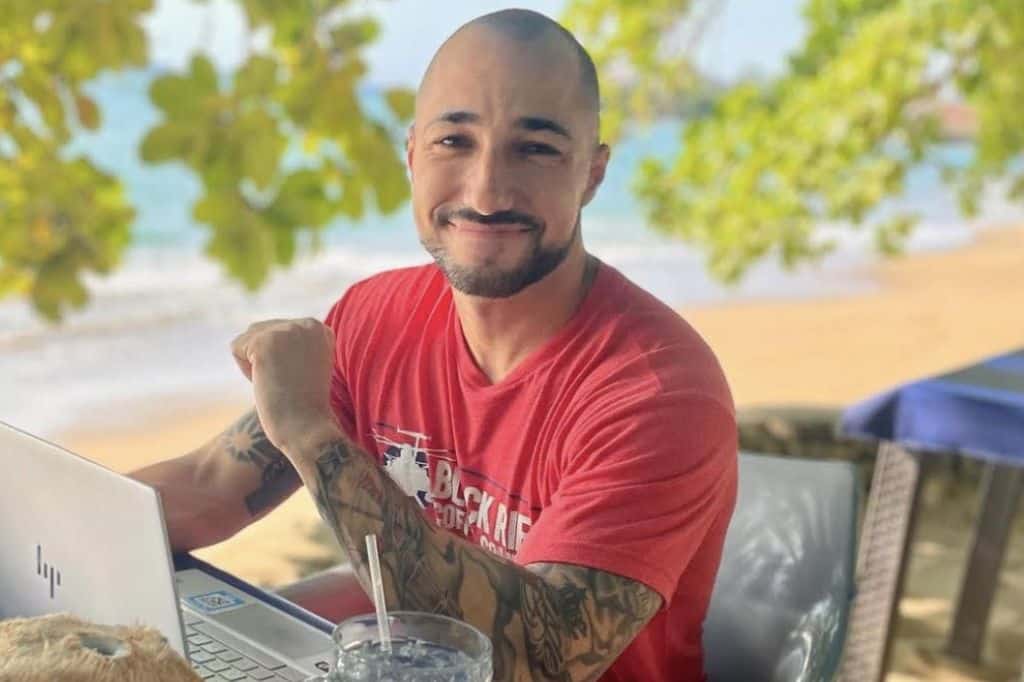
“When people ask me what I do most days, the answer is ‘whatever I want.’” That’s how John Davis, a medically retired Army veteran, sums up life in the Dominican Republic.
Looking for a fresh start and a simple, low-stress lifestyle, John found what he was seeking—and more—in the town of Sosua. In this candid Q&A, part of our Veterans Living Overseas Interview Series, he shares why he chose the Dominican Republic and how he built a sense of purpose through local charity work and veteran events.
If you’re a veteran considering a move overseas, don’t miss John’s take on cost of living, language barriers, daily life, and the real challenges that come with starting over abroad.
When did you retire from the Army and when did you move to the Dominican Republic?
I medically retired from the Army in 2017. I initially moved to Thailand but came back to go to grad school at Harvard.
I came to the Dominican Republic during the pandemic because I was living in Boston and was going to get Boston BAH (basic allowance for housing) no matter where I lived to finish my degree online.
So, moving somewhere with a cheaper cost of living made a lot of sense and at the time, so did escaping the craziness of the United States. So while the rest of the world lost their minds and locked down or whatever else was going on, I was drinking beers on a beach.
When deciding to move overseas, how did you choose your location?
I started in Thailand on my first living abroad journey, but they have stricter visa rules.
In the Dominican Republic, there’s no need to get any type of residency. You can stay as long as you want without doing paperwork. You just pay an exit fee when you leave, depending how long you stay. I got my fill of paperwork and the bureaucracy during the military.
We have great proximity to the United States here, you have full property rights as a foreigner, and we have a huge U.S. veteran population.
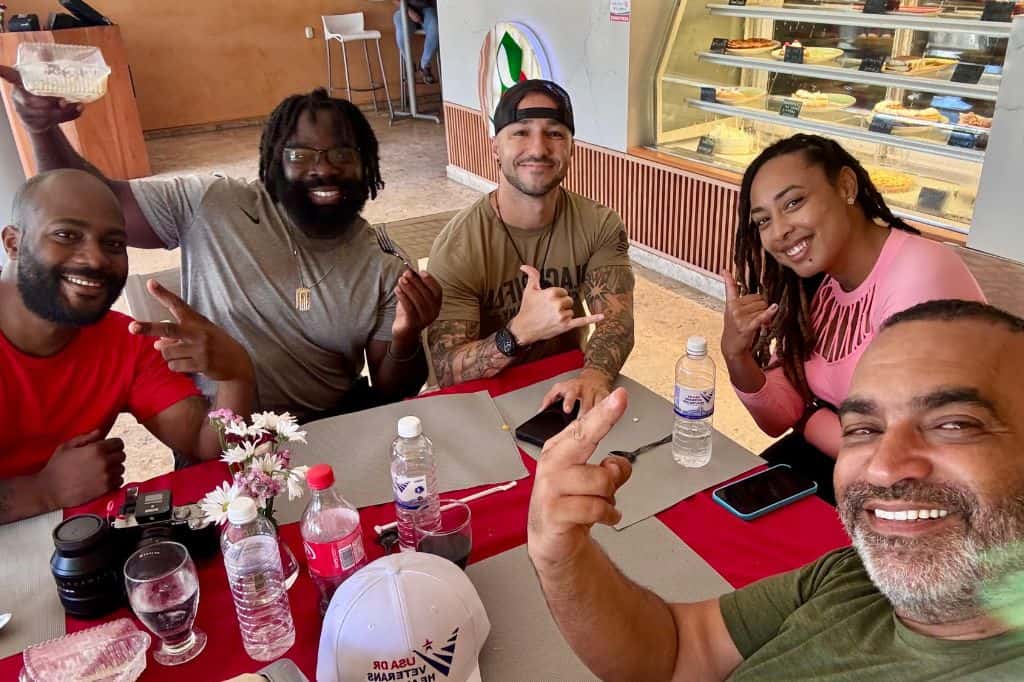
The Dominican culture really appealed to me: family, God, and community are big in everyday life. I enjoy living my life outside, SCUBA diving, playing golf and nature.
I live in Sosua, which is known as somewhat of a party town, but it has a huge expat population. We have a center for U.S. veterans right in town.
I can walk everywhere, from the beach to the gym to restaurants and to bars. I own a golf cart, but I just use it to cruise around town and to the store. My life is pretty simple. I’ve found a simpler life is a better life for me, and the pace here suits me.
Do you speak Spanish? If not, is it difficult to navigate daily life?
I spoke zero Spanish when I came. Now I’m probably 75% fluent and I have no issues navigating life.
We have a big expat population and a lot of the economy is from tourism, so many veterans who live here speak zero Spanish. I still take classes and can navigate daily life in Spanish countries without any issues. I go to Colombia for vacation; there, you need more Spanish.
How does the cost of living in the Dominican Republic compare to the U.S.?
When I talk to veterans about moving to the Dominican Republic, I use the reference, “if you’re rated 100% from the VA then you’re good to go here.” You’ll have a high-quality life and can do pretty much whatever you want.
(Note from Poppin’ Smoke: In 2025 veterans with a 100% disability rating and no dependents receive $3,831 per month.)
Of course, cost of living is hard to nail down for people because everyone has a different ideal quality of life. I live in a beautiful, fully furnished 3-story condo in a gated complex with a private pool. My roommate, another retired veteran, and I both pay $800 per month (all included). My apartment prior to this one was $475 per month for a nice one bedroom and I paid up front for the full year.
I know veterans who rent studio apartments for $300 per month and I know veterans who rent 3-bedroom villas for $2,000 per month. There are areas in the country where you’d get by with cheaper. I live in one of the most expensive areas. Punta Cana is another pricey area. Most expats are concentrated between there and the north coast, where I live.
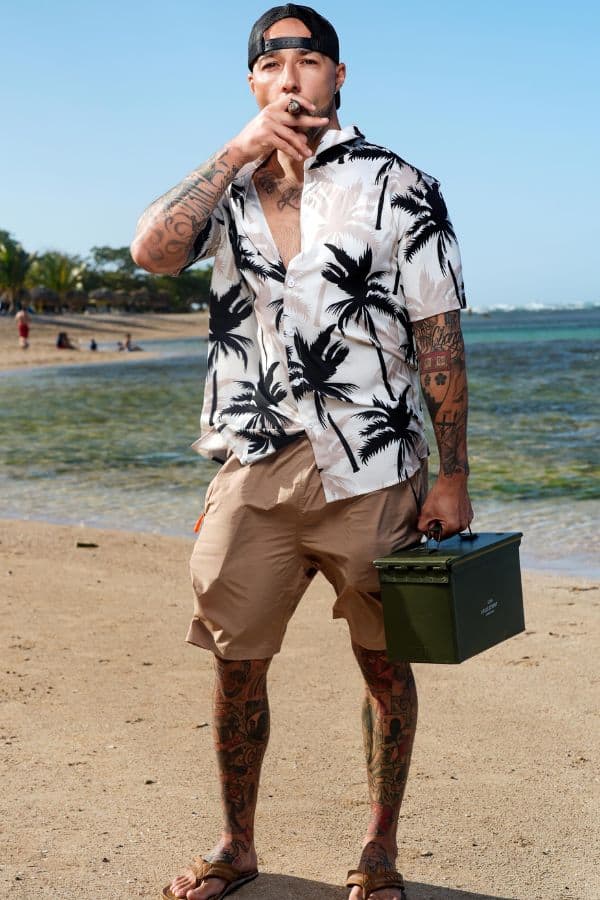
I can get an enormous plate of rice, chicken, avocado and plantains that’s usually enough for two meals for $5.
There are some things I buy from Amazon, like a brand of oatmeal I like, books, clothes or pretty much anything I can’t buy locally.
Where do you get your healthcare?
I’m rated 100% from the VA after medically retiring from the Army. I get my healthcare at USA DR Veterans Healthcare and pay zero out of pocket. I have no local insurance.
For veterans unfamiliar with the VA Foreign Medical Program, I get my weekly therapy for my back, see the chiropractor, and do whatever else I need, and they bill the Veterans Administration.
(Note from Poppin’ Smoke: the VA Foreign Medical Program covers care related to service-connected disabilities.)
Anything I’ve gotten from a local pharmacy, like ibuprofen, is very affordable. As far as general medication, such as cholesterol medicine, blood pressure medications or other prescriptions veterans might need, most is available over the counter for half the price of the United States.
I’ve never bothered to submit anything to TRICARE, since most medications are under $10 and it isn’t worth the effort to me.
| Related Reading: How TRICARE Works When Living Overseas
If you do want what’s considered the top notch medical insurance for expats here, it’ll run you around $1,000 a year for a single person.
Does the Dominican Republic tax your military retirement or other income?
No, the Dominican Republic doesn’t tax anything of mine. I’m a non-resident and don’t have any business here.
If you buy a property here valued under $170,000 then property taxes don’t exist. If you buy a property for $300,000, for example, then you’ll pay about $300 per year in property taxes to the Dominican government. Since I used to pay twelve grand per year for my house in New York, that seems very affordable.
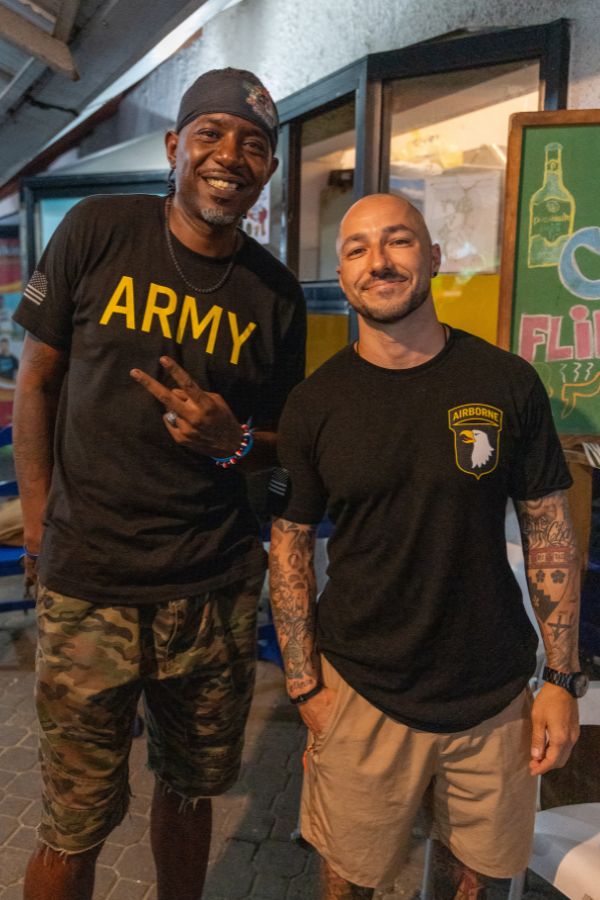
Any income earned from a Dominican source would be taxed. Income is taxed at the national level, not the local level. Obviously, like any American expat I still pay US taxes but I don’t pay anything other than the occasional “Gringo” taxes here.
Is there anything you wish you had known or done differently prior to moving abroad?
When I first got here, I certainly wished I had paid more attention in high school Spanish.
But part of the moving abroad process is living and learning, making mistakes and embracing the adventure. There’s no such thing as a perfect transition abroad; everything is a lesson to me.
I was always a minimalist from being in the military and moving around all the time, so I moved abroad with just a suitcase, and it was a straightforward process to rent a furnished apartment. I had already lived in Thailand while teaching English there, so I was familiar with expat life.
Tell us about life in the Dominican Republic! What’s a typical week?
What I love about living abroad is my time feels more like mine. I’m not stuck in an endless to-do list like in the United States, and I get to control my day.
When people ask me what I do most days, the answer is “whatever I want.” I like to take mornings slow, do my computer work and enjoy a cup of Dominican coffee. Then, I go to the gym, and the afternoon might be SCUBA diving, hanging out at the beach, spending time with friends, or surfing.
There’s really good nightlife culture here in the Dominican Republic and great dancing, (I’m terrible at dancing, but it’s fun). There are parties pretty much every day in neighborhoods or at bars. The Dominican people love to have a good time.
I have a lot of restaurants here, both local and veteran owned, that I love and support.
Getting around is easy. The bus system is very good and I can walk to the bus station from my house and travel anywhere on the island pretty quickly. I’ve never had an issue with public transportation. It’s safe, and although it doesn’t run exactly on time, usually it’s reliable.
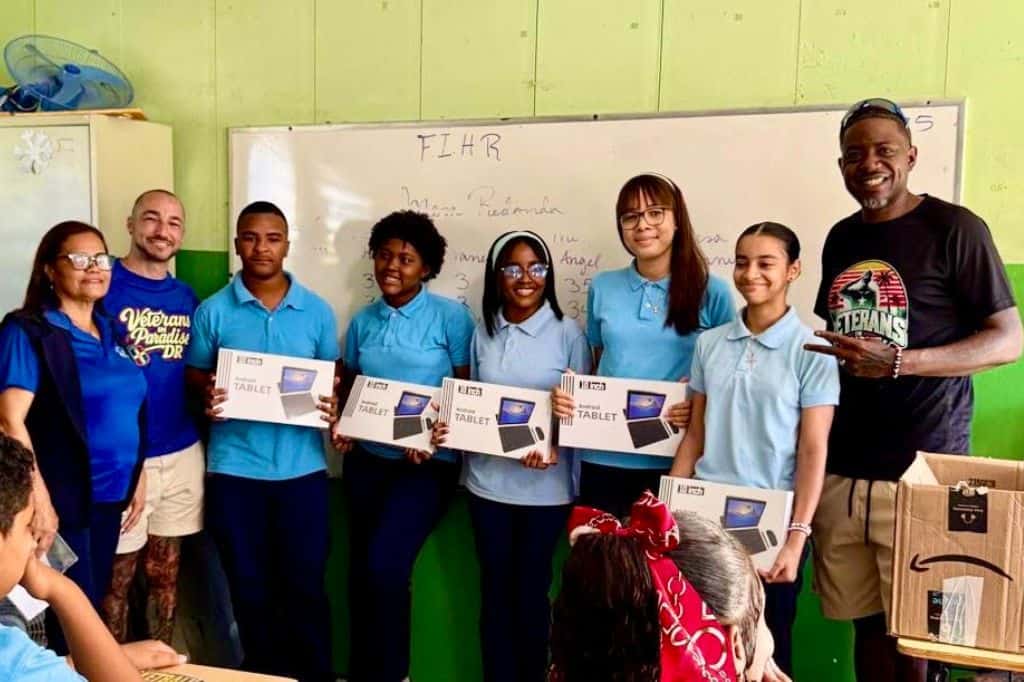
A fellow veteran and I started a small veteran organization, Veterans In Paradise. We hold monthly events and excursions and donate technology items to the local public school. We recently hosted a networking event to raise money to buy tablets. I went to school for education, so it feels good to give back, and a little money goes a long way here.
In your experience, is the Dominican Republic safe?
I’ve never had an issue with safety in 4 years. So to me, yes, but there are areas in certain cities I wouldn’t go.
Do you have many friends from the local population, or do you primarily socialize with other expats?
I try to live in both worlds. A lot of veteran expats here only hang around veterans, but I know a few who live deeper in the culture and primarily have local friends.
Many veterans who come here are Dominican, so they are at home in the culture. I’ve found charity and volunteer work, as well as going to church here, connects me well with the local community. Most of my friends are other veteran expats, but I have local friends as well, and we do more local things like go to the river, baseball games, and festivals.
(Note from Poppin’ Smoke: for another perspective on life in the Dominican Republic, read this interview with a retiree whose wife is Dominican).
Do you feel “accepted” in the local community?
Yes, but I sponsor events here and speak the language pretty well. People in my town also recognize me from the internet and my Instagram and TikTok videos. I always speak well of the people here and treat people well. We have been on the local news for the charity events we do.
I’ll always be an expat and my Spanish will most likely never be perfect. I see a lot of expats take the worst of themselves abroad, but I used moving abroad to try to become a better person.
It was a fresh start for me, so I wanted to give to the local community and not just take. I also work with a local youth boxing program, I grew up boxing, so I buy equipment for the kids and volunteer my time, and that has enabled me to really connect with a lot of locals.
What do you like about living overseas, and what are the challenges?
For me the big eye-opening moment was my mental health. I realized when I came here that I was sleeping through the night, feeling relaxed and at peace.
I struggled getting out of the military, both with PTSD and adjusting to civilian life, and here feels like home. I believe “Home” is an interesting concept for vets, because: where is it?
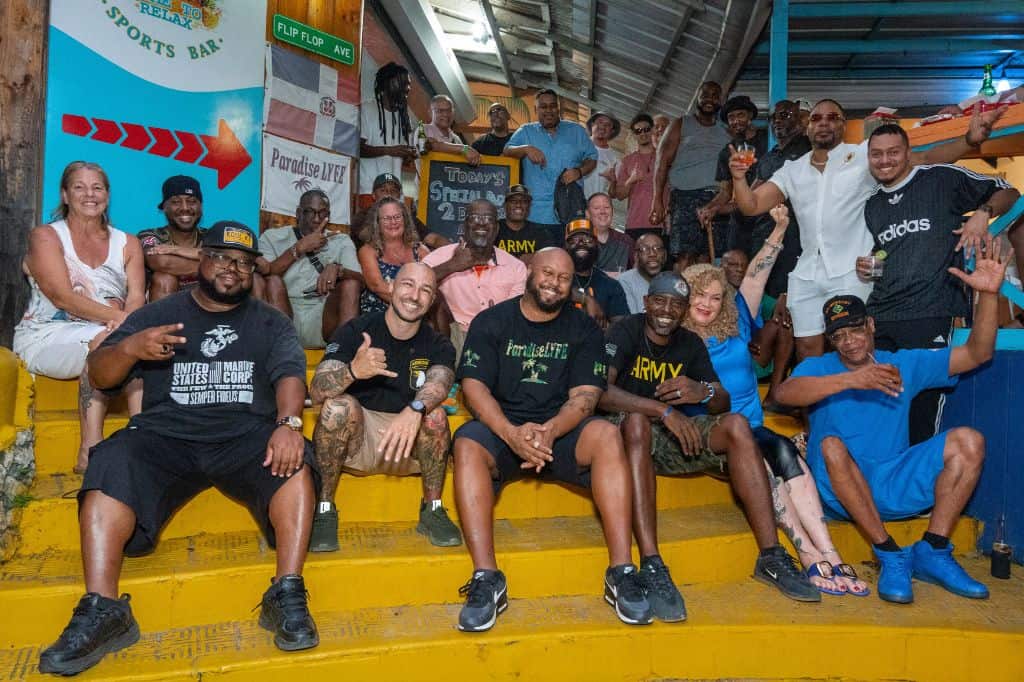
Most vets have a license plate from one state, pay taxes somewhere else, lived a few years here, deployed there, and so on. I was young when I left my home in Iowa for the military, so going back there never made sense to me. I feel more at home here in my Dominican town than in my Iowa hometown.
When people ask me about the downsides to living in the Dominican Republic, honestly not a lot comes to mind. It was a struggle for me initially to adjust to the slower pace of life, but now I love it. It was a struggle for me to speak Spanish at first, but so many people here speak English, it’s not that big of a deal.
Sometimes we have power outages, but I have a generator, and if my AC doesn’t work for a few hours, it’s not the end of the world. Life is obviously cheaper, which is good, but it’s also just better. My quality of life is high, I have a lot of veteran friends here, I love the weather, and I love the Dominican people. I have fun, I don’t stress, and the beaches are beautiful.
I’m a “no kids, no wife, no pets, no plants and no problems” type of veteran. For me, I didn’t have any issues moving abroad. If anything, it was the opposite: I struggled in the States and I thrive here.
Other veterans struggle with missing family, but I don’t. My mom visits, and the problem is getting her to leave rather than to come here.
I’m also someone who enjoys being alone. I like reading and writing. When I want to hang out with friends, I have many. When I want to walk on the beach alone, I can. When I want to go to a nightclub, I do.
I’d say there are three things I see veterans struggle with here. One is isolation: after the military, many vets aren’t used to that much alone time. The second is diving into unhealthy behaviors, like drinking too much and not having purpose or goals. The third is when people can’t handle their finances. You have to be more responsible — not less — with your money here. It’s easy to blow through your cash if you’re on a fixed budget, and that first year abroad is always the most difficult.
What advice would you give to veterans thinking of moving overseas?
Do a 30-day trial run before making any permanent moves. Moving abroad isn’t for most people, but neither is joining the military. A lot of people take a vacation here (or somewhere like here) and think, “Wow, I’d love to live here.” But real life isn’t a vacation, and eventually reality hits.
A trial run lets veterans see what real day-to-day life is about. On your trial run, do normal errands, eat and shop locally, and walk around more than you drive. Attend local events, go out to do your laundry and talk to expats.
When you talk to expats, it’s good to ask questions like “What don’t you like about living here?” and “What financial mistakes did you make?” and “What advice would you have for me thinking about moving here?” Have INTENTIONAL conversations with other expats, don’t just drink beer at a bar and bullshit around.
(Think you’ve found your next home overseas? Answer these 24 questions before you make the move.)
What are your longer-term plans? Do you intend to stay in the DR for the foreseeable future?
I’m fairly confident, barring any unforeseen circumstances, I won’t live in the States again. I’ll stay in the Dominican Republic at least another year or two. We’re having a good time doing veteran events and veteran excursions.
I love swimming in the ocean, the girls here like me, and I have coconut and mango trees in my backyard. I don’t think anywhere is perfect, but there are places closer than others.
John is an Army combat veteran who served in the 101st Airborne Division. He did two deployments to Afghanistan and medically retired as a Staff Sergeant. John’s a Harvard graduate and the author of Combat to College, 365 Days of Veteran Affirmations and the Veterans Guide To Moving Abroad. He also created Veteran Affirmations on Youtube, the only affirmation channel that does mental health affirmations for Veteran PTSD.
John’s organization, Veterans in Paradise, that he co-founded with another veteran, puts on veteran networking events. John writes about living abroad as a veteran on his blog and puts out a newsletter about the Dominican Republic. Follow John on Instagram and TikTok and reach out with any questions about veterans in the Dominican Republic.
